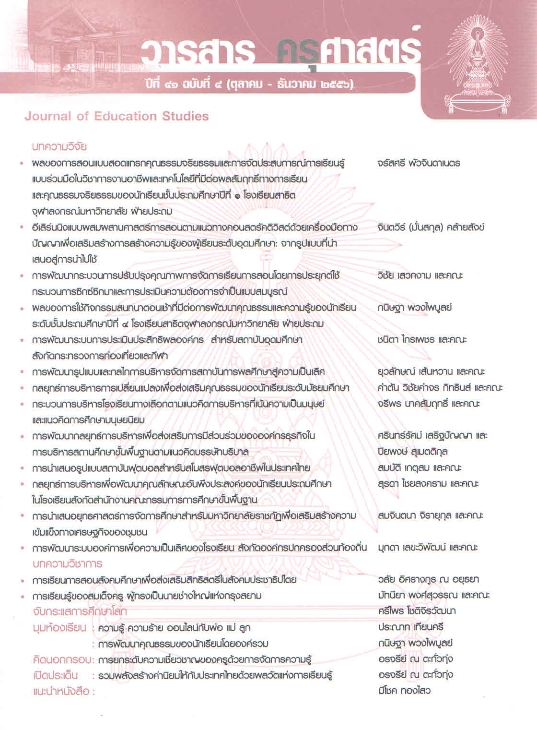การน
Abstract
การวิจัยนี้มีวัตถุประสงค์ ๑) เพื่อศึกษาสภาพการจัดการศึกษาและปัจจัยเงื่อนไขของมหาวิทยาลัย ราชภัฏในการเสริมสร้างความเข้มแข็งทางเศรษฐกิจของชุมชน ๒) เพื่อวิเคราะห์ความเข้มแข็งทาง เศรษฐกิจของชุมชน ๓) เพื่อวิเคราะห์กระบวนการเรียนรู้กิจกรรมทางเศรษฐกิจของชุมชน ๔) เพื่อนำ เสนอยุทธศาสตร์การจัดการศึกษาสำหรับมหาวิทยาลัยราชภัฏเพื่อเสริมสร้างความเข้มแข็งทางเศรษฐกิจ ของชุมชน ผลการวิจัยพบว่า ๑) สภาพการจัดการศึกษา มีนโยบายตามปรัชญาของมหาวิทยาลัยราชภัฏ เพื่อการพัฒนาท้องถิ่นการวิจัยและบริการทางวิชาการส่งเสริมเศรษฐกิจชุมชนตามปรัชญาของเศรษฐกิจ พอเพียงและสนองโครงการพระราชดำริ มีการจัดกิจกรรมและมีเครือข่ายความร่วมมือกับชุมชน สถาบันการศึกษาและองค์กรในท้องถิ่น ๒) ความเข้มแข็งทางเศรษฐกิจระดับชุมชนในพื้นที่ตั้งมหาวิทยาลัย ราชภัฏ มีองค์กรชุมชน กลุ่มผู้ผลิตผลิตภัณฑ์ชุมชน กลุ่มออมทรัพย์ กลุ่มวิสาหกิจชุมชน ภูมิปัญญา ท้องถิ่น ภาคีเครือข่ายการพัฒนาที่ได้รับการส่งเสริมจากมหาวิทยาลัยราชภัฏ ๓) กระบวนการเรียนรู้ กิจกรรมทางเศรษฐกิจของชุมชน มีองค์ความรู้ภูมิปัญญาท้องถิ่นในการผลิต มีฐานการเรียนรู้ทั้งในชุมชน และภายนอกชุมชน มีกระบวนการเรียนรู้การบริโภคตามแนวปรัชญาของเศรษฐกิจพอเพียง ด้านการ ตลาดมีองค์ความรู้จากการแลกเปลี่ยนเรียนรู้ในชุมชน ขาดองค์ความรู้ในการวางแผนการตลาดและช่อง ทางการตลาด มีกระบวนการเรียนรู้การออมโดยกลุ่มออมทรัพย์ในชุมชน ด้านสวัสดิการมีกระบวนการ เรียนรู้ต่อยอดจากกลุ่มออมทรัพย์ ชุมชนต้องการรับการส่งเสริมกระบวนการเรียนรู้กิจกรรมทางเศรษฐกิจ จากมหาวิทยาลัยราชภัฏ ๔) การนำเสนอยุทธศาสตร์การจัดการศึกษาสำหรับมหาวิทยาลัยราชภัฏ เพื่อเสริมสร้างความเข้มแข็งทางเศรษฐกิจของชุมชน ยุทธศาสตร์หลัก ๕ ยุทธศาสตร์คือ ๑) ยกระดับ ความเข้มแข็งของเครือข่ายความร่วมมือในท้องถิ่นเพื่อการผลิตบัณฑิตป้อนระบบเศรษฐกิจชุมชน ๒)พลิกโฉมการวิจัยสู่การวิจัยเชิงพื้นที่เพื่อเสริมสร้างชุมชนเศรษฐกิจเข้มแข็ง ๓) การเชื่อมงานบริการวิชาการกับองค์ความรู้และนวัตกรรมจากการวิจัยสู่การริเริ่มทางเศรษฐกิจของชุมชน ๔) การจัดการ ความรู้ด้านศิลปวัฒนธรรมและภูมิปัญญาของท้องถิ่นที่มีศักยภาพเชิงเศรษฐกิจ ๕) เปลี่ยนกระบวนทัศน์ การบริหารจัดการระดับท้องถิ่นมุ่งเสริมสร้างชุมชนเศรษฐกิจเข้มแข็ง
This study’s objectives were: 1) to study the state of educational management and Rajaphat Universities’ conditional factors for supporting the strength of the economy of the surrounding communities; 2) to analyze the economic strength of the surrounding communities.; 3) to analyze the learning processes regarding the communities’ economic activities; and 4) to propose strategies for educational management for Rajaphat Universities to support the strength of the surrounding communities’ economy. The f indings suggest that: 1) Rajaphat Universities promote policies for fulf illing their philosophy of local development, provide research and academic services for the supporting local economy in accordance with the philosophy of self-suff iciency economy and projects initiated by his Majesty the King, and organize activities and networks among the surrounding communities, educational institutions, and local organizations 2) Rajaphat Universities play a role in supporting the strength of the economy at the level of their surrounding communities, besides local organizations, groups of communities’ producing members, groups saving on production, community enterprises, local wisdom, and networks for development, and 3) for communities’ learning processes regarding the local economy, there is local wisdom and knowledge for producing, there is a knowledge base both inside and outside their communities, there are learning processes regarding consumption in accordance with the self-suff iciency economy philosophy, there is an exchange of knowledge regarding marketing in the communities, there is a lack of knowledge for marketing planning and distribution channels, there are learning processes for saving methods by saving groups in communities. In regards welfare, there are learning processes for extending the knowledge base from governmental saving groups. Further, communities need support regarding learning processes about economic activities from Rajaphat Universities. Proposed strategies for Rajaphat Universities’ educational management to support the economic strength of communities include f ive major areas. These are; 1) increasing the strength of participating networks for producing graduates to work in the local economy; 2) developing research that supports the economic strength of the communities; 3) providing academic service and innovation to support the local economic strength; 4) local managing knowledge concerning the commercialization of local art and culture; and 5) promoting a paradigm local economic shift to new local management that is oriented toward the local economic communities.




